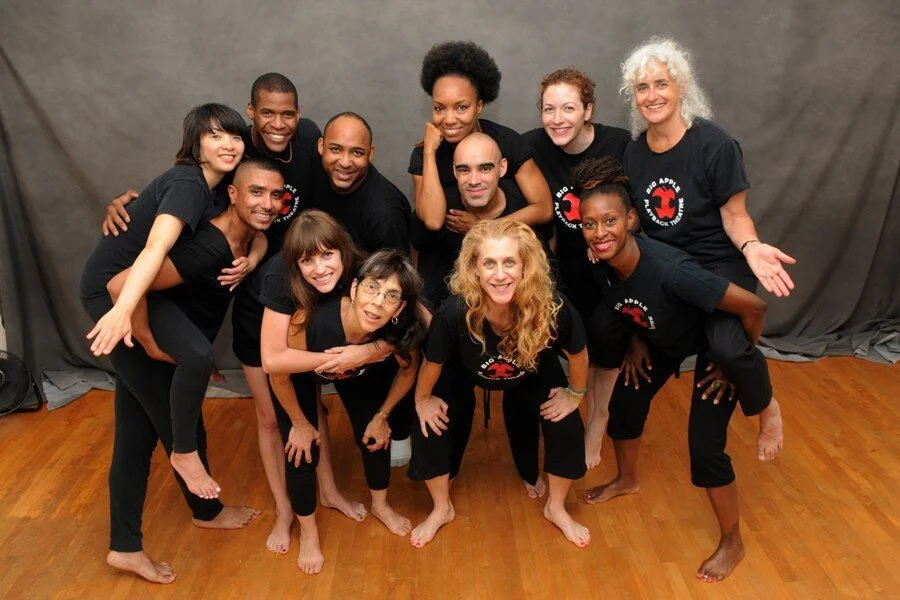History
Big Apple Playback began with Hannah Fox, the daughter of Playback Theatre’s founders, Jonathan Fox and Jo Salas. Hannah had previously founded two playback theatre companies in Oregon but moved back East to complete her master’s degree at NYU. In 2002 she decided to start a new company in New York. Not wanting to do it alone, she asked Erica (then Eigenberg) and Moises Belazrio, former members of the first NYC based Playback Company; Washington Heights Playback.
“We had three principles we wanted to run the company by,” Hannah recalled. “One: we wanted to reflect the demographics of the audience, so we had to have a multicultural, multiracial company—otherwise, we didn’t want to do it. Two: we wanted to pay the actors. The third thing was dance. Erica and I are dancers, and the physicality of theatre was really important to us. I wanted to make sure that what we did artistically would be about embodying the stories.” They chose people for Big Apple through auditions based on an ability to create theater through song, movement, and dialogue, with an eye to to diversity of race, gender, and age as well.
Early Big Apple shows and rehearsals took place at the Knitting Factory, which was then a performance space on Leonard Street in downtown Manhattan that welcomed experimental theater, music, and art. Later, the company’s home base moved to the Center for Remembering and Sharing (CRS) on Union Square. Big Apple has grown and evolved from the beginning, reflecting the dynamic and ever-changing city that is its home. Members join, become an integral part of the close-knit group, and move on if life’s circumstances change; everyone who has passed through the company has left their mark and contributed to its artistic personality.
At a certain point, Hannah remembered, “we started to really dedicate ourselves to the social justice work. So we started telling our own stories, looking at our own biases.” The entire company participated several day-long workshops all about racism and systemic oppression, using Playback to understand it better on a personal level. These events were led by Pamela Freeman and Sarah Halley, Playback veterans from Philadelphia. Members were, and are, very strongly encouraged to attend Undoing Racism workshops offered by The People’s Institute for Survival and Beyond. “It was life-changing,” commented Erica about the first time she had the Undoing Racism experience.
When they began to focus on social justice, Hannah and Erica began to feel the need for a mixed leadership team, feeling that their own white-Jewish, female ethnic identity needed some balance. It took awhile, about five years. When Hannah left, Ricardo Perez took the helm for a year, which proved to be a pivotal time. Nowadays, the different aspects of leadership—artistic, administrative, etc.—are handled by a small group. At last, Hannah and Erica’s vision of a multicultural leadership team has come true.
Big Apple, as a collective, continues to grow and develop. The company has gathered a repertoire of songs contributed by company members over the years, like Yonder Come Day, Teah On, Mama Lie, DogDog, Freedom, Sin Je Je, Love is the Water, and others. Some original Playback forms have been invented or adapted by Hannah and other members, too, which are handed down as oral tradition as the company develops into the future: Once There Was, a ritual show ending; the Beat, a story form with a narrator, a dancer, and a musician; and and show called “Keep The Peace!” based on the anti-bullying model, “No More Bullying”, pioneered by Jo Salas and Hudson River Playback Theatre. Big Apple continues to innovate using playback forms, starting an “Equity, Diversity and Inclusion” program for organizations in 2017. As BAPT gained new members again in 2017, they look forward to continued transformation, growth and learning in 2018 and beyond!
BAPT Company. (2013) photo credit - Ray Llanos


